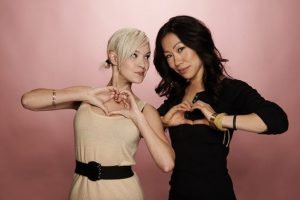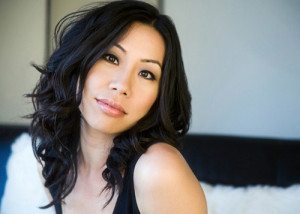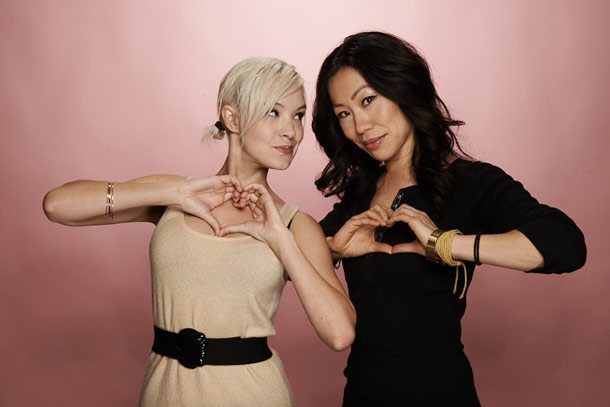 I met Vera Miao in an acting class a few years ago and we hit it off talking about Joss Whedon and feminism. Since then, we have become great friends, spent many a weekend in Palm Springs together, and collaborated on feature film together entitled Best Friends Forever. Vera co-wrote, produced and co-starred in this apocalyptic road trip movie. You may have seen her on NCIS, CSI: Miami, Brothers & Sisters or in her own comedic web series, Mission Rebound. She just won Breakout Actress at the LAAPFF for her starring role in Best Friends Forever on iTunes July 1st and other VOD/cable platforms July 5th.
I met Vera Miao in an acting class a few years ago and we hit it off talking about Joss Whedon and feminism. Since then, we have become great friends, spent many a weekend in Palm Springs together, and collaborated on feature film together entitled Best Friends Forever. Vera co-wrote, produced and co-starred in this apocalyptic road trip movie. You may have seen her on NCIS, CSI: Miami, Brothers & Sisters or in her own comedic web series, Mission Rebound. She just won Breakout Actress at the LAAPFF for her starring role in Best Friends Forever on iTunes July 1st and other VOD/cable platforms July 5th.
– Brea Grant
Vera Miao Interview
Brea: I’m in Baton Rouge writing this. How much do you miss me right now?
Vera: What do racking sobs mean on a scale of missing?
Brea: Let’s start with something I find super interesting about you. You had a completely different career before pursuing acting. Tell me about that and what made you change.
 Vera: I worked with philanthropy and social justice organizations and still do as a consultant. I changed up careers because I personally wanted to act, be more creative, pursue arts as a focus in my life, but also because I believe storytelling is the primary way we change people’s hearts and minds. My parents, who never understood why I would work in a sector called “nonprofit,” are REALLY confused about why I would then move into career that is also often zero profit.
Vera: I worked with philanthropy and social justice organizations and still do as a consultant. I changed up careers because I personally wanted to act, be more creative, pursue arts as a focus in my life, but also because I believe storytelling is the primary way we change people’s hearts and minds. My parents, who never understood why I would work in a sector called “nonprofit,” are REALLY confused about why I would then move into career that is also often zero profit.
Brea: So, you co-wrote, co-starred and produced Best Friends Forever. What would make you do something so completely insane? And what was the hardest part?
Vera: What to some might be called “insanity” to me is simply known as “ignorance.” While it was one of the hardest things I ever did, everyone (especially women, people of color, queers), go out and make your own shit. Don’t wait for anyone else.
Brea: You are now officially a triple threat – an actor/writer/producer. So I’m going to talk to those different sides of you like you’re in the Three Faces of Eve.
Vera: Who? Me?…Yes, you…Who said that…Who is in my head?…Your head, this is MY head…
Brea: Actor side: This is your first lead in a feature. Was it what you’d thought it’d be like? I find that on each project I do, I learn more about what I need as a person to function. Like how poorly I function on a lack of sleep. Did you learn anything about yourself as an actor?
Vera: Nothing about this project was what I thought it would be like, basically because I was blessed/cursed with very little knowledge ahead of time. I learned that even though I wrote half the script, I still wasn’t sure of all of my choices until we got on set, which to me is an indication of resistance on my part to really prepare myself for something I wanted so bad I made it happen. Resistance is a bitch (read The War of Art). On the other hand, I learned that when the time came, I have the capacity to make a choice and commit to it as an actor. And that my ego doesn’t stand in the way of trusting my director.
Brea: Writer side: You wrote this role for yourself. Why did you choose this particular character (besides that I made you)?
Vera: I wanted to play a different kind of character than the one most people cast me as, which i would describe as “young professional” or “Asian-in-a-blazer.” There is nothing wrong with young professional, I’ve been one before (hear that, Aaron Sorkin?), but why not have the chance to show different sides?
 Brea: Producer side: I have spent a lot of time on phone calls with you where you are very good at talking business-y, which is a trait I admire as I have trouble with that (as is clear by use of the word “business-y”). Do you think that is one of your producer strengths?
Brea: Producer side: I have spent a lot of time on phone calls with you where you are very good at talking business-y, which is a trait I admire as I have trouble with that (as is clear by use of the word “business-y”). Do you think that is one of your producer strengths?
Vera: Yup. My ability to bullshit business is a valuable skill. Though, seriously, I’m proud of my years of management, multi-tasking, running complex operations, handling shit. Self-deprecation is only charming to a point, especially in a woman when talking about her experience, leadership and accomplishments.
Brea: When I first met you in an acting class, I was bitching about the sexism in the industry and we basically became immediate friends. Although at the time, you said something very interesting to me. You said that you entered this industry expecting to be out of your element and perhaps to even be surrounded by people who had various prejudices you hadn’t even thought about. Do you think you run into that a lot in the industry? Overall, do you think that shapes your experience in the industry? Did co-writing and producing this movie make that more or less apparent?
Vera: Yeah, I moved from a super politically conscious world of movement activists into the entertainment industry, so it’s a BIG culture shift. For instance, I was told (more than once) by potential agents that I have “good ethnicity,” and by multiple white actresses that they wished they too were “ethnic” like me since it sucked so much to be white when it comes to acting roles. First off, ethnicity is not like hair, and secondly, what is a “bad ethnicity”? And to white actresses who think all the roles are now “ethnic,” name 3 women of color leads on television shows right now. So yeah, it definitely shapes my experience. It is also a lot of why I think it is so important to make your own work.
It’s funny, lots of people want to know what it was like to work on a set that was mostly women. I’m not sure why they want to know that, though I am quick to point out that our crew was NOT mostly women, but our key crew members, those in leadership, were. Like any other indie, low-budget set, it was grueling, hardworking, grim, and lighthearted all at the same time. And I think sometimes people are surprised by the film we made, that it is soulful with a real bite, and not some fluffy giggle-fest. Consequently, we’ve heard the phrase “we’re not sure what the market is for this film” a lot, which I think is code for “this movie does not have A-list celebrities, boobs, or blood.” Ok, there is a little blood. But it’s been a real learning experience to see how much work you have to do to command attention for films about relationships, with women at the center.
Brea: People keep asking us about the subject of the movie and the sort of nerdy “fandom” in it – the direct references to apocalyptic movies, etc. Do you consider yourself a nerd? What are you nerdy for?
Vera: I’m a total nerd. In every way. As a young child, I wore thick glasses and spent all my time in the library finding books to read. I would walk down the street reading. When I wasn’t reading, I was watching TV and movies, often sci-fi, fantasy, horror. I loved comics. I am a TOTAL nerd for anything angels/demons/Gods (Neil Gaiman is my co-pilot), Buffy (Joss Whedon is my other co-pilot), John Hughes, and kung fu.
Brea: What’s the biggest thing you learned on Best Friends Forever?
Vera: Forget about perfection, strive for evolution.
Brea: What’s in store for you in the future? What do you want to be doing?
Vera: Acting. Writing another screenplay. Dancing. Trying to stay on top of my emails.

